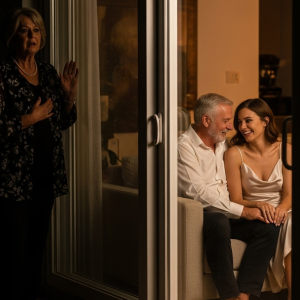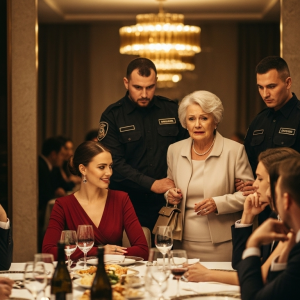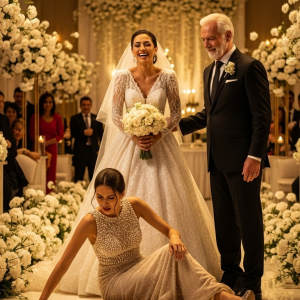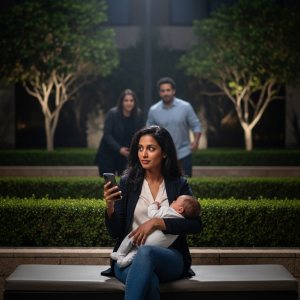His decision didn’t come from nowhere, not really. For weeks, a strange silence had grown between us, filling the spaces where laughter used to be. He’d stare at his phone, a faint, secret smile playing on his lips—a smile I realized was no longer meant for me. I’d dismissed it as work-related stress, a foolish, trusting assumption from a woman who had known him for half her life. We had weathered storms together, or so I thought. The possibility of another person had never even been a whisper in my mind.
That evening, the confession tumbled out of him, clumsy and cruel. “I’ve met someone,” he said, and those four words became the axe that split my world in two.
“She’s the most incredible woman I’ve ever seen,” he continued, his eyes fixed on a point over my shoulder, refusing to meet mine. “We’ve been talking for three months. She makes me feel… alive. I’m not happy here anymore.”
Every word was a physical blow. A storm of anger and a cold, heavy despair churned in my stomach. He had the audacity to reassure me, to say he still “loved us,” but that he couldn’t deny this new, electric feeling for Isabella. “I have to meet her,” he insisted, his voice pleading. “I have to see if this is real.”
The walls of our cozy kitchen felt like they were shrinking, suffocating me. “You’re leaving?” My voice was a fragile, trembling thing. “You’re leaving us—the children—for a woman you’ve never met?”
He nodded slowly, a terrible, final motion. “I don’t expect you to understand. But I need to do this for myself.” He promised financial support, a hollow gesture that meant nothing when he was carving out our family’s heart. He needed to “follow his heart,” he said, and meet the “love of his life.”
I wanted to scream, to shatter every plate in the cabinet, to claw at him until he saw the devastation in my eyes. But one look at his face—a mask of determined selfishness—told me it was over. He had already left us long before he packed his bags.
The following week, he was gone. Explaining it to the children was the hardest thing I’ve ever done. Emily, at nine, was a whirlwind of questions I couldn’t answer. “But why doesn’t Daddy love us anymore?” she’d ask, her innocent eyes searching mine for a logic that didn’t exist. Nathan, only four, didn’t understand the words, but he felt the seismic shift in our world. He clung to me constantly, his small body a warm anchor in my sea of sorrow. My children were the only reason I didn’t drown.
My family was furious; his was heartbroken. His parents pleaded with him over the phone, their voices cracking, but he fed them the same story. Days bled into weeks, weeks into months. The silence from him became absolute. I was left to pick up the pieces, building a new life on the ruins of the old one, for my children and for myself. Robert’s parents were my lifeline, offering money when I was short and babysitting whenever the weight became too much to bear.
Eight years passed. Robert became a ghost, a distant memory. The money he sent at first dwindled and then stopped. I became a single mother in every sense of the word, working tirelessly to be both provider and nurturer. Emily eventually stopped asking about him. Nathan’s memory of his father was a hazy blur. They grew into remarkable, resilient young people, their lives defined not by the father who left, but by the mother who stayed.
Life had found a new, stable rhythm. Then, Robert’s father passed away. We attended the funeral, a strange reunion of a family he had abandoned. Later, his family’s lawyer contacted me. Robert’s father, a man of quiet kindness, had left a sum of money for Emily and Nathan. It wasn’t a fortune, but it was enough to cover their college expenses.
When I told the kids, their faces erupted in pure joy. For the first time in years, a heavy weight lifted from my shoulders. It felt like a final gift from a good man, a glimmer of light after a long, dark tunnel.
Then, last week, my phone rang. An unknown number.
“Hello?”
A pause, and then a voice I hadn’t heard in eight years. “It’s me. It’s Robert.”
The world tilted. A flood of conflicting emotions—rage, shock, a flicker of some old, forgotten pain—left me speechless. He sounded hesitant, older. He said he needed to see me, urgently.
“Why?” I managed to ask, my voice tight.
“I have an offer,” he pleaded, his tone desperate. “Please. I just need to talk to you.”
Why now? After eight years of deafening silence, why this sudden urgency? Against my better judgment, I agreed to meet him at a small café near my office. I didn’t tell the children. This was a ghost I needed to face alone first.
On the day of our meeting, I saw him before he saw me. He looked… worn. The confident man who had walked out on us was gone, replaced by someone older, with shadows under his eyes. Our greeting was a landscape of awkward silence. We were strangers who knew each other’s deepest secrets.
Finally, he began his story. Isabella, the online dream girl, had been a nightmare. She was a single mother who had lied about her life, a gambling addict who had burned through his money. “I chose to stay,” he said, looking down at his hands. “I couldn’t bear to fail again, to give up on someone else.”
But his father’s death had been a wake-up call. He spoke of regret, of missing his family, of the colossal mistakes he had made. He told me his father had left him the family lake house, the sprawling property where we had spent so many happy summer vacations. He planned to sell it. He’d be set for life.
I just nodded, my heart a cold, still stone.
Then came the bombshell. The “offer.”
“I want to come back,” he said, his eyes finally meeting mine, filled with a desperate sincerity. “I want to give our family a second chance. We can sell the house. You’ll never have to work again. The kids can have anything they want. We can have a luxurious life, a better life.”
I stared at him, disbelief warring with a new, rising fury. He wanted to use his inheritance as a key to unlock the door he had slammed shut eight years ago. He thought money could patch the gaping wounds he had left in our lives.
The offer of financial security was a siren’s call, I won’t deny it. But as I looked at him, I didn’t see a savior. I saw the man who made my nine-year-old daughter ask why her daddy didn’t love her anymore.
“No,” I said, the word firm and clear. “I appreciate the offer, Robert, but I can’t just forget the last eight years. I raised our children alone. We may not have luxury, but we have a stable, happy life. I built this life from the ashes you left behind. I will not risk letting you burn it down again.”
He pleaded, his eyes welling with tears, but my decision was made. I had to protect my children. More importantly, I had to protect the woman I had become in his absence: a survivor.
My parents, however, didn’t see it my way. When I told them I had rejected Robert’s offer, they were aghast. “Think of the children!” my mother urged. “After everything he put you through, this is the least he can do. People can change. You’re letting your pride stand in the way of their comfort.” Their words stung, planting seeds of doubt in my mind. Was I being selfish?
After days of wrestling with my choice, I knew I had to talk to Emily and Nathan. They deserved to know. I sat them down after dinner and gently explained that their father had reappeared, bringing with him an offer of a new life funded by the sale of the lake house.
Emily, now a sharp and perceptive seventeen-year-old, reacted with a fury that mirrored my own. “He thinks he can just buy us back?” she scoffed, her eyes flashing. “Where was he when I needed a father to teach me how to drive? Where was he when Nathan broke his arm? He doesn’t get to come back now that it’s convenient.” She remembered the pain, and she had no interest in seeing him.
Nathan, at twelve, was more detached. “I don’t really remember him,” he said with a shrug. “I’m happy with how things are. I don’t need a stranger.”
Their voices solidified my resolve. The well-being of my children was paramount, and their emotional peace was worth more than any lake house. I knew I had made the right choice. My next step was clear: I needed to file for divorce. The legal tie was the last thread connecting me to this man, and it was time to cut it.
Robert, however, wouldn’t give up. His calls became relentless, his texts desperate. Worried he might show up at my work or the kids’ school, I felt cornered. I decided to reach out to the one person who might be able to get through to him: his mother.
I met her for coffee, intending to ask for her help and inform her of my decision to file for divorce. It was then that she revealed the real reason for his persistence.
“It’s the will, dear,” she said, her voice heavy with sadness. “My husband was a clever man. He put a clause in it. Robert only inherits the lake house if—and only if—he officially reconciles with you and the children. To solidify the claim, you have to sign the papers, too.”
The revelation hit me like a physical shock. It wasn’t about regret. It wasn’t about rebuilding our family. It was a cold, calculated business transaction. He was pursuing me not out of love, but for a piece of real estate. The entire situation was a cruel, emotional manipulation. The man I married was well and truly gone, replaced by a desperate con artist.
Armed with this ugly truth, I blocked his number. The next time he saw me, it would be when I served him divorce papers.
Two months later, I was ready. I reached out to Robert under the pretense of discussing his offer. He agreed immediately. To my surprise, Emily and Nathan said they wanted to come. They had questions. They needed closure.
We met at a local park, a place filled with ghosts of happier family picnics. Robert’s face lit up when he saw us, but the hope in his eyes quickly faded when he saw our expressions.
“I know about the clause, Robert,” I said, my voice steady. “I know why you’re really here.”
He protested, claiming he genuinely wanted us back, but his lies were transparent. I told him we were finished. “But before we go,” I said, “your children have some questions. The least you can do is give them honest answers.”
He nodded, looking ashamed.
Emily’s voice was quiet but sharp as glass. “Was she worth it? Was she worth eight years of missed birthdays? Of me learning to ride a bike by myself? Was she worth my childhood?”
Robert flinched. “I was lost,” he mumbled. “I made a terrible mistake.”
Nathan, ever direct, asked, “Was finding your happiness more important than being our dad?”
“I… I wasn’t thinking straight,” he stammered, admitting he was wrong.
He recounted the painful details of his life with Isabella, trying to paint himself as a victim. He talked about his guilt, his shame, how he didn’t know how to face us. My children listened, their faces unreadable, but I knew they didn’t believe his performance.
He made one last, desperate plea, reiterating his offer of a luxurious life.
That’s when I looked at my children and saw not victims, but warriors. They had survived his abandonment and thrived. They didn’t need him.
“We’ve moved on,” I said, pulling the divorce papers from my bag and placing them on the picnic table between us. “We don’t need you, or your money.”
He stared at the papers, his face a mask of remorse and defeat. “Wait,” he begged. “Let’s just split the sale of the house. We can both benefit.”
Emily stepped forward. “We don’t need your charity money,” she said, her voice ringing with pride. Nathan nodded beside her. “We have everything we need to be happy.”
At that moment, Robert finally broke. He started to cry, apologizing over and over. But it was too late. As I walked away from the park, holding my children’s hands, I felt a weight I didn’t even know I was carrying finally lift. I was free. Our divorce will proceed, but in my heart, it’s already done. Our future is our own now, and we’re writing a story filled not with pain and betrayal, but with love, resilience, and the strength we found in each other.
Since that day in the park, life has begun to blossom in unexpected ways. I received a promotion at work, a culmination of years of hard work. The financial security it brings is empowering, but the real reward is the satisfaction of knowing I achieved it on my own.
The divorce is proceeding smoothly. My lawyer is excellent and, after hearing our story, is confident we can achieve a clean break. Therapy has been a wonderful tool for the children. They are learning to process the complex emotions tied to abandonment, and I can already see them growing more confident and open.
I’m also pouring my energy into their passions. Emily’s art fills our home with color and life, and our weekends are spent cheering for Nathan on the soccer field. Seeing them thrive is my greatest joy.
As for Robert, we maintain no contact. However, the drama found one last way to reach me. Isabella, his former partner, sent me a message. It wasn’t an apology. It was a tirade of accusations, blaming me for “taking Robert away” and destroying her relationship. She called me manipulative and hurled insults, completely blind to the fact that she was the one who had helped shatter my family eight years ago.
I replied once, with cold, hard truth. “I have no desire to be with Robert and am divorcing him. The life you built with him was based on the wreckage of mine. If you need someone to blame, look to his choices and your own.” Then, I blocked her. I will not allow her toxicity to poison the peace we have fought so hard to build.
Robert’s mother and I still speak occasionally. She confirmed that because of my refusal to reconcile, Robert did not inherit the lake house. His selfish decisions cost him everything: his first family, his second relationship, and finally, his inheritance. It’s a harsh justice, but a fitting one.
Our journey has been difficult, but the healing is real. My children are resilient, our future is bright, and this chapter of our lives is finally, truly, our own.




